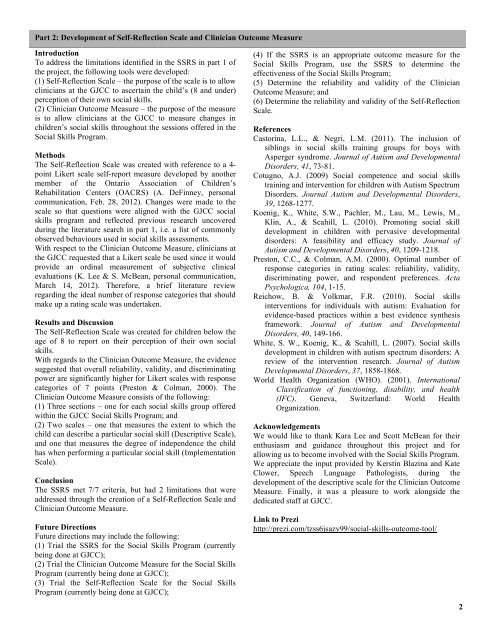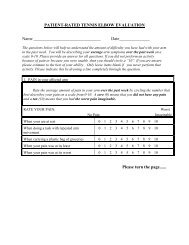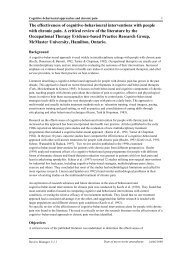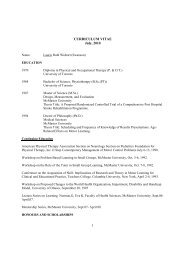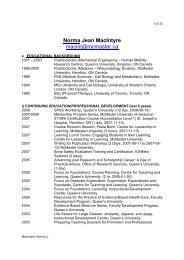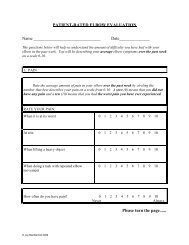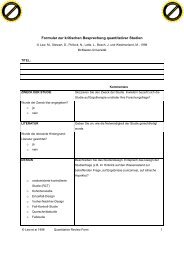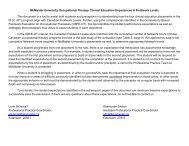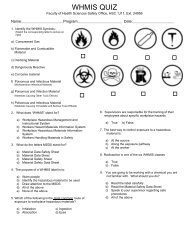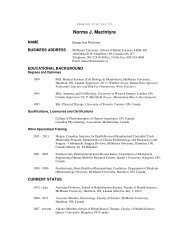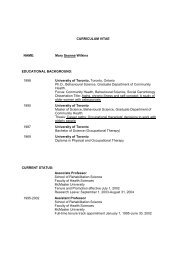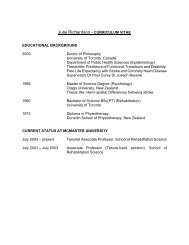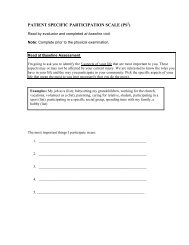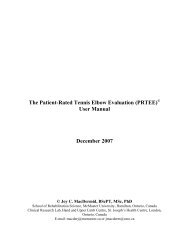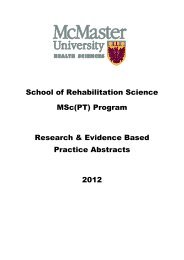Evidence Based Practice Symposium - McMaster University
Evidence Based Practice Symposium - McMaster University
Evidence Based Practice Symposium - McMaster University
You also want an ePaper? Increase the reach of your titles
YUMPU automatically turns print PDFs into web optimized ePapers that Google loves.
Issue Part 2: #: Development [Date] of Self-Reflection Scale and Clinician Outcome Measure<br />
Dolor Sit Amet<br />
Introduction<br />
To address the limitations identified in the SSRS in part 1 of<br />
the project, the following tools were developed:<br />
(1) Self-Reflection Scale – the purpose of the scale is to allow<br />
clinicians at the GJCC to ascertain the child’s (8 and under)<br />
perception of their own social skills.<br />
(2) Clinician Outcome Measure – the purpose of the measure<br />
is to allow clinicians at the GJCC to measure changes in<br />
children’s social skills throughout the sessions offered in the<br />
Social Skills Program.<br />
Methods<br />
The Self-Reflection Scale was created with reference to a 4point<br />
Likert scale self-report measure developed by another<br />
member of the Ontario Association of Children’s<br />
Rehabilitation Centers (OACRS) (A. DeFinney, personal<br />
communication, Feb. 28, 2012). Changes were made to the<br />
scale so that questions were aligned with the GJCC social<br />
skills program and reflected previous research uncovered<br />
during the literature search in part 1, i.e. a list of commonly<br />
observed behaviours used in social skills assessments.<br />
With respect to the Clinician Outcome Measure, clinicians at<br />
the GJCC requested that a Likert scale be used since it would<br />
provide an ordinal measurement of subjective clinical<br />
evaluations (K. Lee & S. McBean, personal communication,<br />
March 14, 2012). Therefore, a brief literature review<br />
regarding the ideal number of response categories that should<br />
make up a rating scale was undertaken.<br />
Results and Discussion<br />
The Self-Reflection Scale was created for children below the<br />
age of 8 to report on their perception of their own social<br />
skills.<br />
With regards to the Clinician Outcome Measure, the evidence<br />
suggested that overall reliability, validity, and discriminating<br />
power are significantly higher for Likert scales with response<br />
categories of 7 points (Preston & Colman, 2000). The<br />
Clinician Outcome Measure consists of the following:<br />
(1) Three sections – one for each social skills group offered<br />
within the GJCC Social Skills Program; and<br />
(2) Two scales – one that measures the extent to which the<br />
child can describe a particular social skill (Descriptive Scale),<br />
and one that measures the degree of independence the child<br />
has when performing a particular social skill (Implementation<br />
Scale).<br />
Conclusion<br />
The SSRS met 7/7 criteria, but had 2 limitations that were<br />
addressed through the creation of a Self-Reflection Scale and<br />
Clinician Outcome Measure.<br />
Future Directions<br />
Future directions may include the following:<br />
(1) Trial the SSRS for the Social Skills Program (currently<br />
being done at GJCC);<br />
(2) Trial the Clinician Outcome Measure for the Social Skills<br />
Program (currently being done at GJCC);<br />
(3) Trial the Self-Reflection Scale for the Social Skills<br />
Program (currently being done at GJCC);<br />
(4) If the SSRS is an appropriate outcome measure for the<br />
Social Skills Program, use the SSRS to determine the<br />
effectiveness of the Social Skills Program;<br />
(5) Determine the reliability and validity of the Clinician<br />
Outcome Measure; and<br />
(6) Determine the reliability and validity of the Self-Reflection<br />
Scale.<br />
References<br />
Castorina, L.L., & Negri, L.M. (2011). The inclusion of<br />
siblings in social skills training groups for boys with<br />
Asperger syndrome. Journal of Autism and Developmental<br />
Disorders, 41, 73-81.<br />
Cotugno, A.J. (2009) Social competence and social skills<br />
training and intervention for children with Autism Spectrum<br />
Disorders. Journal Autism and Developmental Disorders,<br />
39, 1268-1277.<br />
Koenig, K., White, S.W., Pachler, M., Lau, M., Lewis, M.,<br />
Klin, A., & Scahill, L. (2010). Promoting social skill<br />
development in children with pervasive developmental<br />
disorders: A feasibility and efficacy study. Journal of<br />
Autism and Developmental Disorders, 40, 1209-1218.<br />
Preston, C.C., & Colman, A.M. (2000). Optimal number of<br />
response categories in rating scales: reliability, validity,<br />
discriminating power, and respondent preferences. Acta<br />
Psychologica, 104, 1-15.<br />
Reichow, B. & Volkmar, F.R. (2010). Social skills<br />
interventions for individuals with autism: Evaluation for<br />
evidence-based practices within a best evidence synthesis<br />
framework. Journal of Autism and Developmental<br />
Disorders, 40, 149-166.<br />
White, S. W., Koenig, K., & Scahill, L. (2007). Social skills<br />
development in children with autism spectrum disorders: A<br />
review of the intervention research. Journal of Autism<br />
Developmental Disorders, 37, 1858-1868.<br />
World Health Organization (WHO). (2001). International<br />
Classification of functioning, disability, and health<br />
(IFC). Geneva, Switzerland: World Health<br />
Organization.<br />
Acknowledgements<br />
We would like to thank Kara Lee and Scott McBean for their<br />
enthusiasm and guidance throughout this project and for<br />
allowing us to become involved with the Social Skills Program.<br />
We appreciate the input provided by Kerstin Blazina and Kate<br />
Clower, Speech Language Pathologists, during the<br />
development of the descriptive scale for the Clinician Outcome<br />
Measure. Finally, it was a pleasure to work alongside the<br />
dedicated staff at GJCC.<br />
Link to Prezi<br />
http://prezi.com/tzss6jsazy99/social-skills-outcome-tool/<br />
2<br />
2


